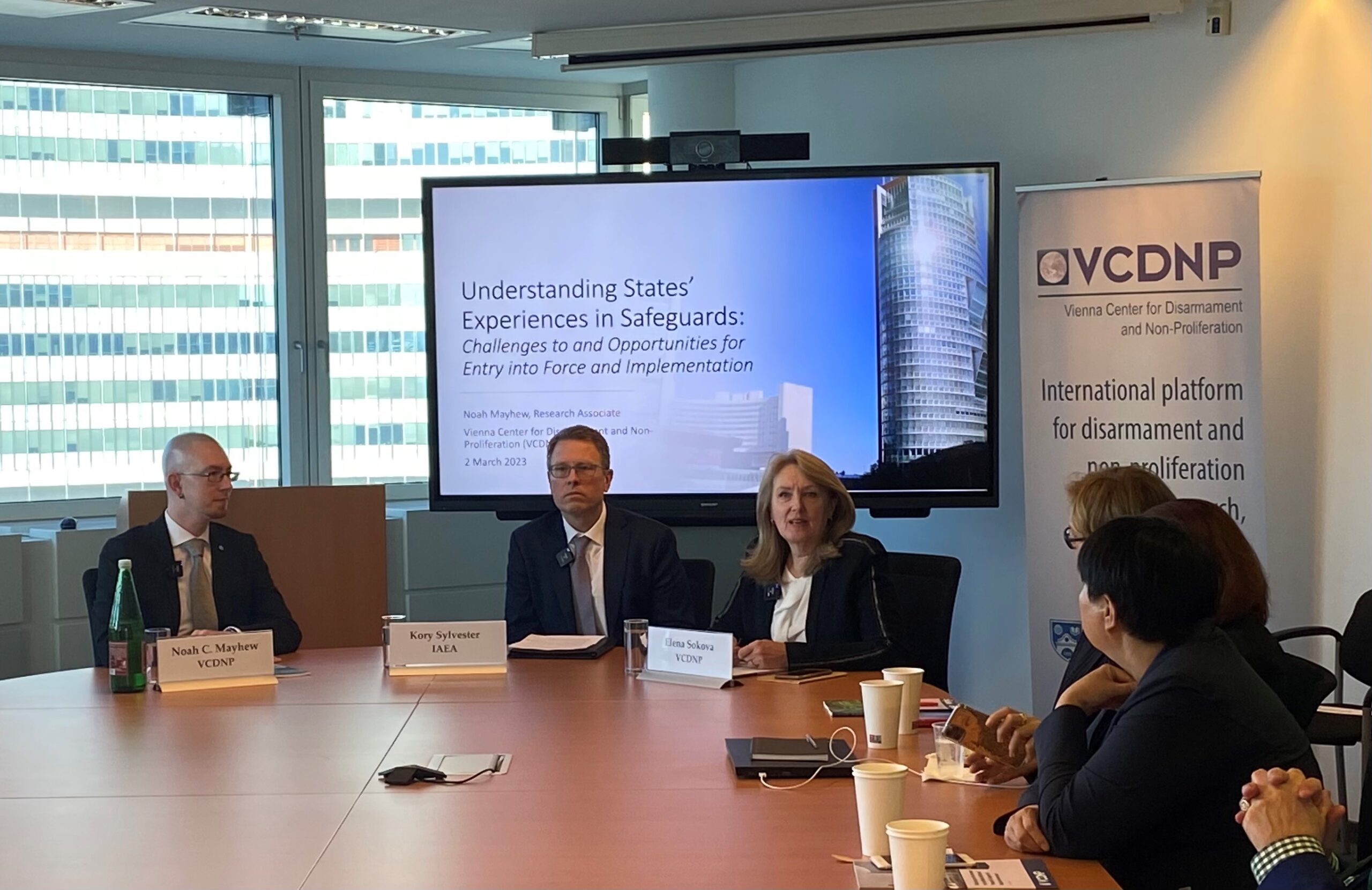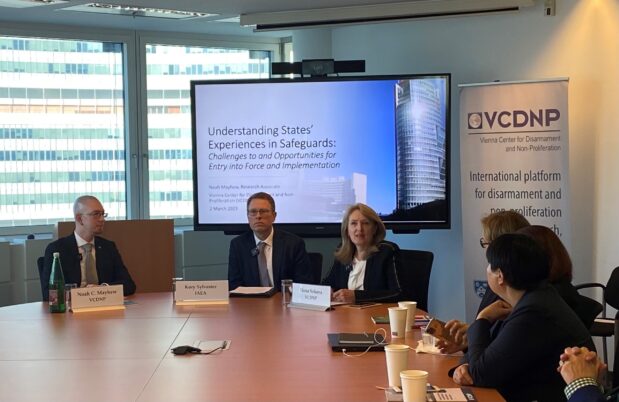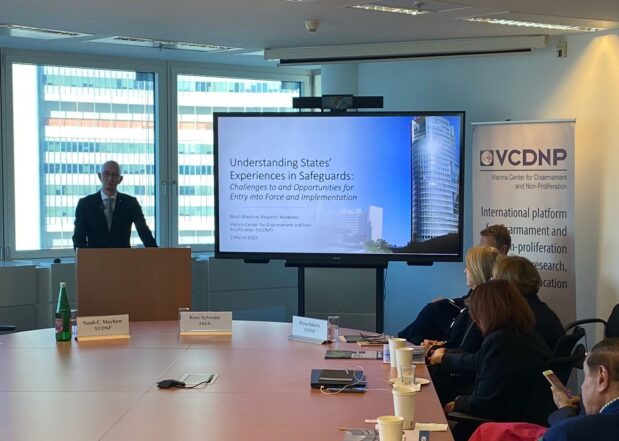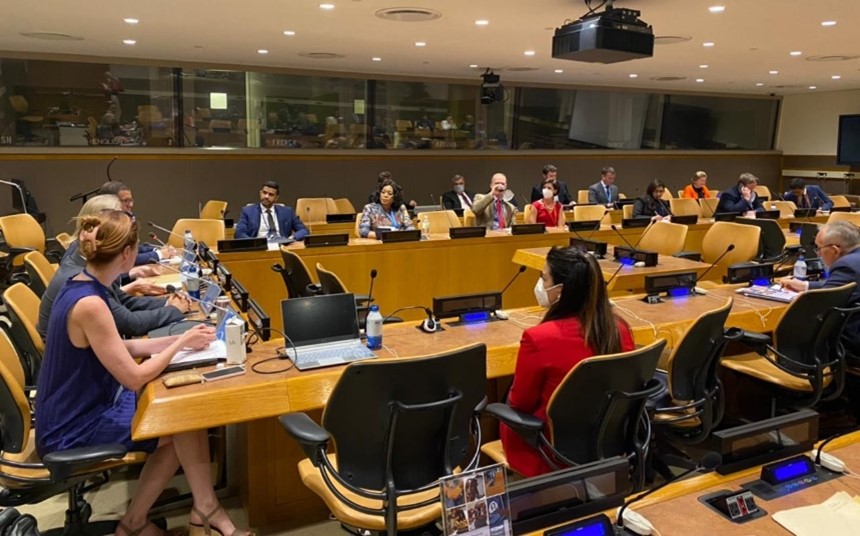
On 2 March 2023, the VCDNP held a launch event for the new study, entitled “Understanding States’ Experiences in Safeguards: Challenges to and Opportunities for Entry into Force and Implementation”. The report is the result of a VCDNP and Verification Research, Training and Information Centre (VERTIC) project that aimed to provide actionable, Member State‑driven recommendations for the IAEA, States and Groups of States that conduct outreach and capacity building activities on safeguards to increase the impact of such activities.
VCDNP Research Associate Noah Mayhew presented the findings of the project at the launch event. Dr. Kory Sylvester, Director of the Division of Concepts and Planning in the International Atomic Energy Agency’s (IAEA) Department of Safeguards provided opening remarks. VCDNP Executive Director Elena K. Sokova moderated the event.

Introducing the launch event, Ms. Sokova remarked that the project touches all three pillars of the VCDNP’s activities: impact‑driven research, results‑oriented dialogue, and capacity building in the nuclear field. The event was the culmination of six months of intensive efforts by the VCDNP and VERTIC to better understand the experiences and motivation of States in the safeguards field. She noted the laudable efforts of the IAEA in this regard and thanked the IAEA for its support of the VCDNP’s activities across its three pillars. She emphasised that the recommendations contained in the final VCDNP‑VERTIC report are aimed not just at the IAEA, but also at States and groups of States that conduct outreach and capacity building activities.
During his opening remarks, Dr. Sylvester noted the timeliness of the VCDNP‑VERTIC project for a few reasons. First, the premise of the project—better understanding of the domestic and international factors that affect State decision‑making on safeguards—supports the IAEA’s own initiatives in strengthening safeguards. This includes the Director General’s recent efforts to bring into force outstanding comprehensive safeguards agreements (CSAs) as required by the Treaty on the Non‑Proliferation of Nuclear Weapons, conclude more additional protocols (APs) to those agreements, and amend or rescind outdated small quantities protocols (SQPs). Second, the project comes at an important juncture in safeguards history, as 2022 was the 25th anniversary of the Model AP and the 50th anniversary of CSA implementation.
Dr. Sylvester explained that the strength of the safeguards system comes from States’ commitments to forgo nuclear weapons, as well as the IAEA’s ability to verify those commitments under the States’ safeguards agreements. This, in turn provides the confidence needed for the IAEA to deliver on its mission: atoms for peace and development. Dr. Sylvester also discussed some of the IAEA’s current initiatives in safeguards capacity building, including the Comprehensive Capacity-Building Initiative for SSACs and SRAs (COMPASS). He said that the aspect of the VCDNP‑VERTIC project that promotes the sharing of Member States’ experiences in safeguards was important for the safeguards system in general and supports COMPASS in particular.

During the presentation of findings, Mr. Mayhew discussed the genesis of the project. He said that, on the one hand, universalisation in the safeguards legal framework was a primary goal of the global non‑proliferation regime. On the other hand, many States struggle with safeguards entry into force and implementation in terms of technical and human capacity, awareness about safeguards instruments, and nuclear matters in general. Thus, the goal of the project was to help bridge this gap.
Throughout the project, the VCDNP and VERTIC interviewed officials from 17 States that had recently taken action on safeguards. Later, they hosted a workshop with 10 of these individuals to craft Member State‑driven recommendations for the final report, which were divided into five themes:
The report contains 24 recommendations under those themes, which are available in the final report.
The VCDNP extends its thanks to the Foreign Commonwealth and Development Office of the United Kingdom for its generous support that funded this project.



